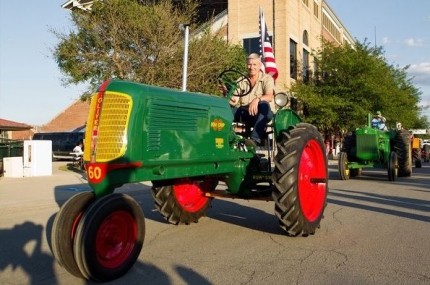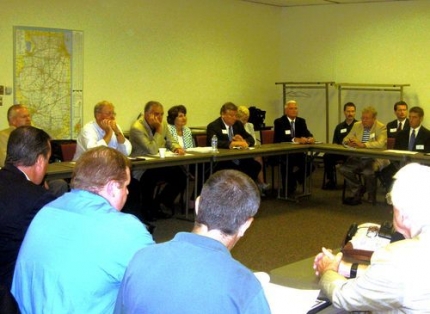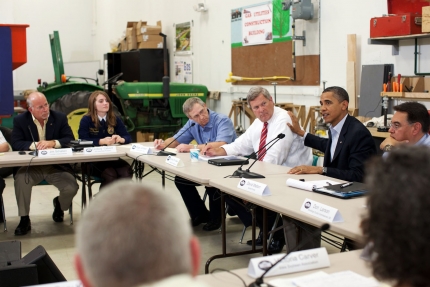Related Rural Blog Posts
The Economic Power of Outdoor Recreation
Posted by on August 22, 2011 at 3:48 PM EDTEd. note: This article has been cross-posted from the Department of the Interior's web site
President Obama has made it clear that job creation is, and must remain, front and center for his Administration day in and day out.
With that in mind, I traveled to New England this week to highlight the economic power of outdoor recreation and tourism to create jobs. Hunting, fishing, and outdoor recreation contribute an estimated $730 billion to the U.S. economy each year. And one in twenty U.S. jobs are in the recreation economy – more than there are doctors, lawyers or teachers.
More than 12 million Americans hunt; more than 30 million Americans fish; and three out of four Americans engage in some kind of healthy outdoor activity.
A letter I recently received from a Canadian family shows just how big an impact tourism and recreation can have. The family spent 42 days on the road, exploring national parks across the U.S. Over the course of their travels, they stayed in motels and hotels, ate in restaurants and spent money in local businesses from coast to coast:
“Our family spent almost $20,000 on our trip,” the letter reads, “almost all of it at local stores and services as we traveled. Without the National Park Service, our destination would have probably been somewhere in Europe.”
Many small and large businesses in New England are also key drivers of the outdoor economy. A store like LL Bean is a shining example of how a home-grown business can fulfill the American dream. What started almost 100 years ago as one man’s idea to sell a waterproof boot to hunters has grown into a company that today employs 5,000 people and generates 1.4 billion in revenue.
The businesses I visited this week -- including L.L. Bean’s headquarters in Freeport, Maine, Bibens Ace Hardware in Colchester, Vermont, and Eastern Mountain Sports near Portsmouth, New Hampshire -- demonstrate the power of outdoor recreation to create jobs and spur economic growth in communities both in New England and across our country. When we invest in conservation and encourage people to reconnect with nature, we aren’t just investing in the land, water, and wildlife we love, but also in our economic future.
Stories from the Rural Economic Forum
Posted by on August 22, 2011 at 1:45 PM EDTLast week, one of President Obama's stops during his economic bus tour was a Rural Economic Forum in Peosta, Iowa, held in conjunction with the White House Rural Council. Along with members of his Cabinet, the President met with a diverse group of local business leaders, farmers, private sector leaders and rural organizations. During the forum, the President walked through his new jobs initiative for rural America, which includes committing up to $350 million in SBA growth capital to investors in rural small businesses over the next 5 years, launching a series of events to connect private equity and venture capital investors with rural start ups and creating teams to link federal funding opportunities with private investors interested in making rural investments.
As the President said in his closing remarks, our job “has to be to get behind what you’re doing; our task has to be making sure that nothing stands in your way, that we remove any obstacles to your success.” Listening to those remarks were a few area business leaders who are succeeding in their communities, creating jobs and growing their companies.
State Fair Roundtable an Opportunity to Hear from Rural Leaders Across Illinois
Posted by on August 22, 2011 at 12:58 PM EDTEd note: this article was cross-posted from the Department of Transportation's blog
Visiting the Illinois State Fair is one of my favorite summertime traditions. From livestock competitions to concerts to a giant butter cow, the Fair is great opportunity to spend time with my grandkids and see everything that Illinois has to offer.
But my visit to the Fair on Friday wasn’t only about fun and games. As part of the President's efforts to reach out to people in America's heartland, I was pleased to lead a roundtable with members of the Illinois Chamber of Commerce, small business owners, farmers, rural organizations, and government officials to hear their ideas about what DOT can do to continue expanding opportunities for them.
Look, every day, President Obama, Vice President Biden, and all of us in this Administration are working hard to put Americans back on the jobsite. We know that continued federal investments in rural communities will create construction jobs and ensure that farmers and ranchers have the roads, rail lines, and ports they need to move their products to market.
We have worked hard to create opportunities across all regions of the U.S., and during our first two years in office, we put Americans to work on more than 7,000 individual transportation projects in rural areas.
When the rural economy in America is growing and prospering, the overall economy benefits. President Obama and this Administration won't be satisfied until every American who wants work can find a job, and we're working tirelessly to accelerate our economy recovery.
DOT is doing our part to help rural communities thrive. Earlier this month, we released guidance for states to make sure they clearly understand the very common-sense exceptions to regulations governing the transport of agricultural products, which allow farmers, their employees, and their family members to accomplish their day-to-day work and get their products to market.
DOT is now in the third round of funding for the Transportation Investments Generating Economic Recovery (TIGER) program, a competitive grants program that has helped a number of rural cities and towns build innovative projects and lay the foundation for future economic growth. Through this program we have also invested in safety--we have already funded 24 major rural projects to replace unsafe bridges, and make roads safer.
Friday's roundtable was a great opportunity to speak to Americans who live in rural areas and work every day to keep our heartland's economy thriving. I hope to keep the dialogue open and look forward to continuing DOT's work expanding opportunities and supporting economic growth in rural communities across America.
Learn more about RuralWeekly Address: Putting Country Ahead of Party
Posted by on August 20, 2011 at 5:30 AM EDTFrom a farm in the Midwest, President Obama talks about the determination and integrity of the American people and calls on Congress to put aside their differences to grow the economy.
Weekly Wrap Up: On the Road
Posted by on August 19, 2011 at 3:51 PM EDTThis week most of the action took place far away from the West Wing, as the President and many of his senior advisors hit the road to talk with Americans in rural towns and communities in Minnesota, Iowa and Illinois.
Rural Road Trip: From August 15-18, President Obama traveled through the Midwest, meeting with Americans in rural towns and communities in Minnesota, Iowa and Illinois. The purpose of his trip, dubbed the Economic Rural Tour 2011, was to have conversations with people from different walks of life about what is happening in our country right now. The President was there to talk, but also to listen. His message at the end of his trip? There’s nothing wrong with our country that can’t be fixed.
Summer Tour: The President was not the only member of the Administration on the road this week. In fact, this summer there are more than 100 events being held across the country in support of the White House’s Rural Economic Council, which this week released a Jobs and Economic Security report. The Council held a Rural Economic Forum in Iowa, where the President announced several new initiatives to help create jobs and grow the economy in rural communities.
VP in Asia: Vice President Joe Biden logged even more miles than the President this week, as he headed to China for the first stop on his three country trip through Asia. In addition to meeting with Chinese leaders in Beijing, the VP also attended a U.S.-China business roundtable and chatted with locals at a snack shop in the city. You can follow his travels live on Twitter – #VPin Asia.
Historic Appointments, Historic Delays: The President’s nominations for federal judges embody an unprecedented commitment to expanding the racial, gender and experiential diversity of the men and women who enforce our laws and deliver justice. Unfortunately, the delays these nominees are encountering on Capitol Hill are equally unprecedented. Check out this infographic to understand what this means for Americans seeking justice.
Immigration Update: The Department of Homeland Security announced a new strategy that focuses immigration resources in a way that puts public safety and national security first. Cecilia Muñoz, Deputy Assistant to the President and Director of Intergovernmental Affairs, held Office Hours via Twitter to explain the change and what it means.
Super Bowl Champs in the House: On August 12, the Green Bay Packers paid a visit to the President, where he congratulated the team on their championship season. Team members took a tour of the White House and gave a shout out to the First Lady, whose work with Let’s Move inspires their own Fit Kids program, which helps educate Wisconsin children about good health and smart eating habits.
Learn more about RuralSpotlight on Rural America
Posted by on August 19, 2011 at 9:39 AM EDTToday, I am hosting a forum focused on the rural economy at the Iowa State Fair. But, Rural America has been in the spotlight all this week as I joined President Obama to travel across parts of Minnesota, Iowa and Illinois, visiting rural communities to discuss his Administration’s efforts to create jobs and drive economic growth. From investments in rural broadband to efforts to support small-business innovation, the President talked about his commitment to rural America – and he listened to what local residents had to say.
The centerpiece of his trip was the Rural Economic Forum, held Tuesday at Northeast Iowa Community College in Peosta. There, 200 small business owners, farmers, retirees, elected officials and others came together to discuss their ideas for a revitalized rural economy. I was pleased to participate in that forum, along with my Cabinet colleagues Housing and Urban Development Secretary Donovan, Transportation Secretary LaHood, and Administrator Mills of the Small Business Administration.
After opening remarks by the President, the participants broke into a series of small discussion groups – with topics ranging from agricultural innovation and energy opportunities to small business to infrastructure. Each group developed a series of ideas and recommendations, which will become part of a larger report to the White House Rural Council that I chair.
I had the opportunity to facilitate the Ag Innovation and Energy break-out session, with about 20 farmers, ranchers, and other officials. Our discussion – which the President joined for a few minutes – touched on the importance of the renewable energy sector and new markets, as well as particular barriers to growing the rural economy through agricultural innovation.
- &lsaquo previous
- …
- 14
- 15
- 16
- 17
- 18
- 19
- 20
- 21
- 22
- …
- next &rsaquo


